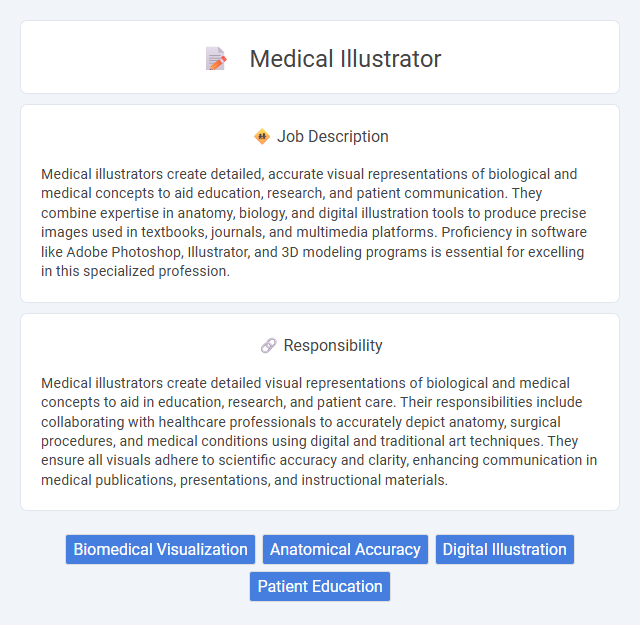
Medical illustrators create detailed, accurate visual representations of biological and medical concepts to aid education, research, and patient communication. They combine expertise in anatomy, biology, and digital illustration tools to produce precise images used in textbooks, journals, and multimedia platforms. Proficiency in software like Adobe Photoshop, Illustrator, and 3D modeling programs is essential for excelling in this specialized profession.
Medical illustrators likely suit individuals with strong artistic skills and a deep understanding of anatomy and medical concepts. People who enjoy precision, attention to detail, and translating complex information into visual formats may find this career fulfilling. Those uncomfortable with scientific material or lacking patience for meticulous work might be less compatible with this profession.
Qualification
A medical illustrator must possess a strong foundation in both art and life sciences, often requiring a bachelor's or master's degree in medical illustration or a related field. Proficiency in advanced graphic design software, anatomy, and visual communication techniques is crucial for creating accurate and informative visual content. Certification from organizations such as the Board of Certified Medical Illustrators (CMI) enhances credibility and demonstrates expertise in the specialized field.
Responsibility
Medical illustrators create detailed visual representations of biological and medical concepts to aid in education, research, and patient care. Their responsibilities include collaborating with healthcare professionals to accurately depict anatomy, surgical procedures, and medical conditions using digital and traditional art techniques. They ensure all visuals adhere to scientific accuracy and clarity, enhancing communication in medical publications, presentations, and instructional materials.
Benefit
Medical illustrator roles likely offer benefits such as a unique blend of art and science, enhancing communication in healthcare through visually accurate and detailed representations. This job may provide opportunities for collaboration with medical professionals, contributing to education and research advancements. There is a probability of flexible work environments, including freelancing possibilities, which can offer creative freedom and diverse project exposure.
Challenge
Medical illustrators probably face the challenge of accurately translating complex anatomical and medical information into visually clear and educational images. They are likely required to balance artistic creativity with strict scientific accuracy, which can be demanding given the constant advancements in medical knowledge. Mastery of specialized software and continuous learning about medical terminology and technology seem essential to overcome these challenges effectively.
Career Advancement
Medical illustrators advance their careers by specializing in complex anatomical imaging and mastering cutting-edge 3D visualization technologies. Gaining certification from organizations like the Board of Certification of Medical Illustrators enhances professional credibility and opens opportunities in academic, biomedical, and pharmaceutical sectors. Pursuing advanced degrees or continuing education in medical art and communication further positions illustrators for leadership roles and high-profile projects.
Key Terms
Biomedical Visualization
Medical illustrators specializing in biomedical visualization create detailed, scientifically accurate images that communicate complex medical and biological concepts. They combine expertise in anatomy, physiology, and digital illustration techniques to produce educational materials for textbooks, research publications, and healthcare presentations. Proficiency in 3D modeling software and an understanding of medical imaging technologies are essential for creating vivid, accurate visualizations that enhance learning and research in the biomedical field.
Anatomical Accuracy
Medical illustrators specialize in creating visuals that ensure exact anatomical accuracy to support education, research, and clinical communication. Their work demands a deep understanding of human anatomy, facilitated by collaboration with medical experts and the use of advanced imaging technologies. Precision in depicting muscles, bones, organs, and physiological processes is critical for enhancing comprehension in medical textbooks, surgical guides, and patient education materials.
Digital Illustration
Medical illustrators specializing in digital illustration create detailed and accurate visual representations of complex medical and scientific concepts using advanced software tools like Adobe Photoshop, Illustrator, and 3D modeling programs. Their work supports education, research, and patient communication by transforming intricate anatomical and physiological data into clear, engaging images. Proficiency in anatomy, medical terminology, and digital art techniques is essential for producing precise and impactful medical visuals.
Patient Education
Medical illustrators create detailed visual content that helps patients understand complex medical information, enhancing patient education and engagement. Their expertise in anatomy, physiology, and digital design enables the production of accurate, clear images that simplify explanations of procedures, diseases, and treatments. Effective medical illustrations improve health literacy, empower patients to make informed decisions, and reduce anxiety by visually communicating medical concepts.
 kuljobs.com
kuljobs.com